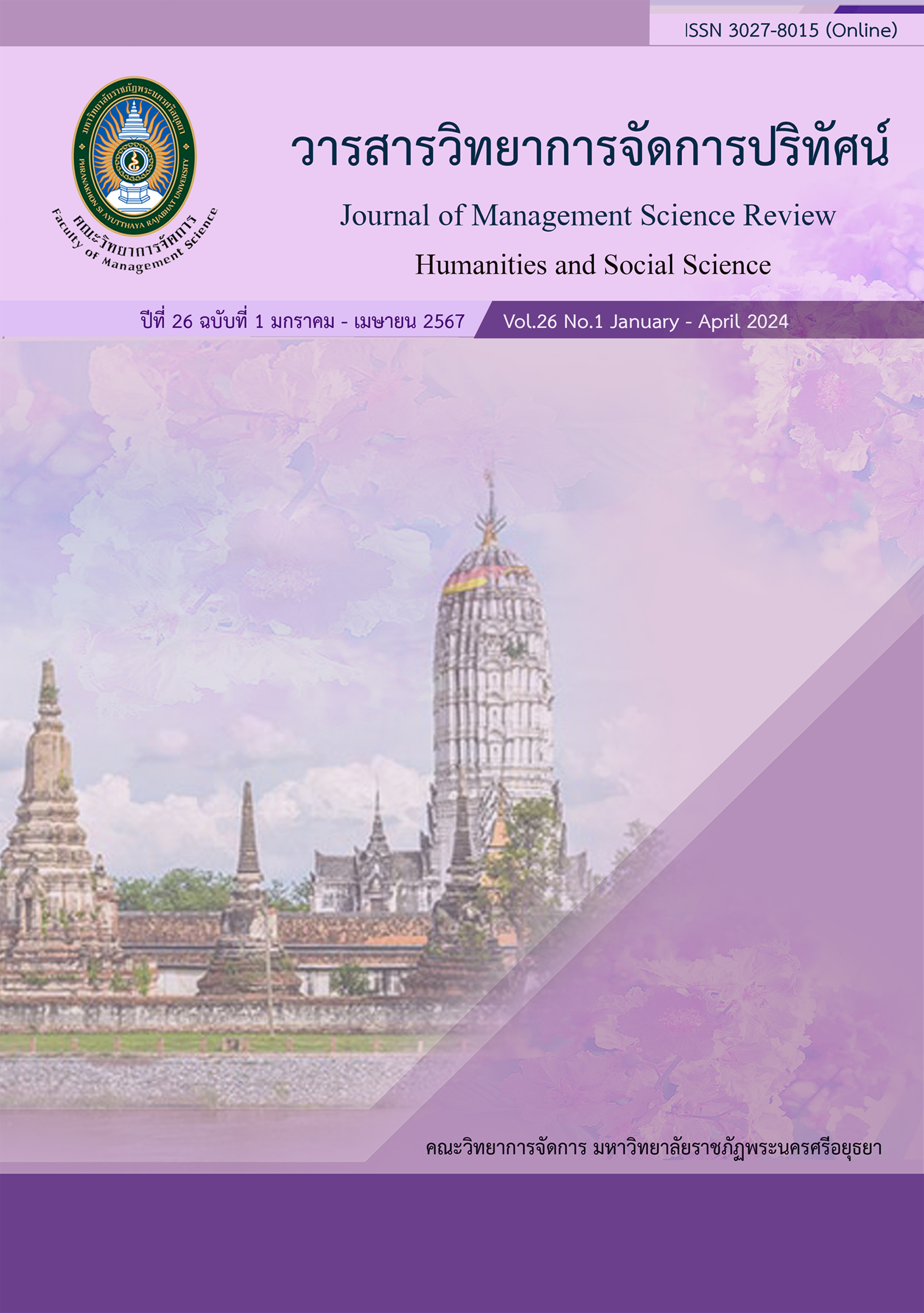อิทธิพลของการตลาดโซเชียลมีเดีย การสื่อสารปากต่อปากแบบอิเล็กทรอนิกส์ การตลาดอินฟลูเอนเซอร์ และ การตลาดเนื้อหา ต่อความตั้งใจในการจองห้องพักโรงแรมในพัทยา
คำสำคัญ:
การตลาดโซเชียลมีเดีย, การสื่อสารปากต่อปากแบบอิเล็กทรอนิกส์, การตลาดอินฟลูเอนเซอร์, การตลาดเนื้อหา, การจองห้องพักโรงแรมบทคัดย่อ
งานวิจัยนี้มีวัตถุประสงค์เพื่อศึกษาพฤติกรรมการจองห้องพักโรงแรมในพัทยา เปรียบเทียบความตั้งใจในการจองห้องพักโรงแรมในพัทยาจำแนกตาม เพศ รายได้ การศึกษา และอาชีพ และศึกษาอิทธิพลของการตลาดโซเชียลมีเดีย การสื่อสารปากต่อปากแบบอิเล็กทรอนิกส์ การตลาดอินฟลูเอนเซอร์ และการตลาดเนื้อหา ต่อความตั้งใจในการจองห้องพักโรงแรมในพัทยา กลุ่มตัวอย่างของงานวิจัย คือ นักท่องเที่ยวชาวไทยที่มีประสบการณ์การจองห้องพักโรงแรมในพัทยาผ่านออนไลน์จำนวน 400 คน โดยใช้วิธีการสุ่มแบบบังเอิญ สถิติที่ใช้ในการวิเคราะห์ข้อมูล ได้แก่ สถิติเชิงพรรณนา โดยใช้ค่าร้อยละ ความถี่ ค่าเฉลี่ย และส่วนเบี่ยงเบนมาตรฐาน และสถิติอนุมาน โดยใช้ ค่าสถิติ t การวิเคราะห์ความแปรปรวนทางเดียว การวิเคราะห์สัมประสิทธิ์สหสัมพันธ์แบบเพียร์สัน และการวิเคราะห์การถดถอยเชิงพหุคูณ
ผลการวิจัยพบว่าอายุที่แตกต่างกันมีอิทธิพลต่อความตั้งใจในการจองห้องพักโรงแรมในพัทยาแตกต่างกัน Generation Z เป็นกลุ่มที่มีค่าเฉลี่ยความตั้งใจในการจองห้องพักโรงแรมในพัทยาสูงสุด การตลาดอินฟลูเอนเซอร์(IM) มีอิทธิพลต่อความตั้งใจในการจองโรงแรมในพัทยามากที่สุด (B = 0.287) รองลงมาคือ การตลาดเนื้อหา (CM) (B = 0.255) การสื่อสารปากต่อปากแบบอิเล็กทรอนิกส์ (eWOM) (B = 0.167) และการตลาดโซเชียลมีเดีย (SMM) (B = 0.096) ตามลำดับ และได้สมการพยากรณ์ความตั้งใจในการจองห้องพักโรงแรมในพัทยาดังนี้ Y = 0.746 + 0.287*IM + 0.255*CM + 0.167*eWOM + 0.096*SMM
เอกสารอ้างอิง
Anjarani, P. M., Mumin, A. T., Bilqis, L. D. R., & Ingkadijaya, R. (2023). The effect of social media marketing on purchase intentions with brand awareness and perceived quality as intervening variables at Aston Bellevue Radio Dalam hotel in Jakarta. [Master’s thesis]. Binus University.
Atito, M., El-Jalil, A., Gaber, S., & Rady, A. (2023). The effect of e-WOM through social media on purchasing intention: The mediating role of e-trust at the Egyptian Youth Hostels. International Journal of Tourism and Hospitality Management, 6(1), 206-228.
Bank of Thailand. (2023). Thai tourism recovery. Retrieved June 13, 2023, From https://www.bot.or.th/th/research-and-publications/article/chaengsibia/article-2023jun13.html
Chan, M. T. Y., Fong, L. H. N., & Law, R. (2021). Choosing the right social media influencer for hotel: The perspective of consumers. Journal of Hospitality and Tourism, 19(1), 36-47.
Charoensuwan, K., & Chindaprasert, K. (2022). Digital marketing situation of hotel business in Pattaya city, Chonburi province. Phikun Journal, 20(2), 51-65.
Cochran, W. G. (1977). Sampling techniques (3 rd ed.). New York: John Wiley & Sons.
Data Innovation and Governance Institute. (2023). Statistics on the tourism situation in Thailand. Retrieved Aug 17, 2023, From https://digi.data.go.th/showcase/thailand-tourism-statistics/
Deegan, O. (2021). Influenced: The impact of influencer marketing on the travel and tourism industry of Ireland. [Doctoral dissertation]. Dublin Business School.
Egger, C. (2016). Identifying key opinion leaders in social networks-an approach to use Instagram data to rate and identify key opinion leader for a specific business field. [Doctoral dissertation]. Hochschulbibliothek der Technischen Hochschule Köln.
El-Said, O. A. (2020). Impact of online reviews on hotel booking intention: The moderating role of brand image, star category, and price. Tourism Management Perspectives, 33, 100604.
Galdolage, B. S. (2020). A book review: marketing 4.0 moving from traditional to digital by Philip Kotler, Hermawan Kartajaya and Iwan Setiawan, Wiley, 2017; ISBN 978-1-119-34120-8 (cloth); ISBN 978-1-119-34106-2 (EPDF). Sri Lanka Journal of Management Studies, 2(2), 155-157.
Hair, J. F., Black, W. C., Anderson, R. E., & Babin, B. J. (2019). Multivariate data analysis (8 th ed.). London: Cengage Learning.
Kulin, P. (2020). Factors affecting the decision of a hotel accommodation of Thai tourists in Sukhothai province. [Master’s thesis]. Ramkhamhaeng University.
Ladhari, R., & Michaud, M. (2015). EWOM effects on hotel booking intentions, attitudes, trust, and website perceptions. International Journal of Hospitality Management, 46, 36-45.
Mahendru, A. (2015). Indian hotel industry: Transformation through digital marketing. International Journal of Business Management, 2(1). 522-531
MGR. (2023). Revealing Chonburi tourism income in September 2023. Retrieved Oct 28, 2023, From https://mgronline.com/local/detail/9660000096948
Ministry of tourism and sports. (2023). Domestic Tourism Statistics (Classify by region and province 2023). Retrieved Oct 24, 2023, From https://www.mots.go.th/news/category/705
Pattaya information Center. (2023). Pattaya economic information. Retrieved Oct 2023, From https://info.pattaya.go.th/DocLib5/ข้อมูลด้านเศรษกิจของเมืองพัทยา.aspx
Prakoso, S. A., Bangsawan, S., & Pandjaitan, D. R. H. (2023). The Influence of the Implementation of CHSE (Cleanliness, Health, Safety, and Environmental Sustainability), e-WOM, and trust on the purchase intention of star-rated hotels in Lampung. Journal of Economics, Finance and Management, 6(10). 4958-4969.
Prudnikov, Y., & Nazarenko, A. (2021). The role of content marketing in the promotion of medical goods and services. Health Economics and Management Revies, 1, 23-29.
Sesar, V., Hunjet, A., & Kozina, G. (2021). Influencer marketing in travel and tourism: literature review. Economic and Social Development: Book of Proceedings, 182-192.
Siripipatthanakul, S., Limna, P., Siripipattanakul, S., & Auttawechasakoon, P. (2022). The relationship between content marketing, e-promotion, e-WOM and intentions to book hotel rooms in Thailand. Asia Pacific Journal of Academic Research in Business Administration, 8(2), 35-42.
Sosanuy, W., Siripipatthanakul, S., Nurittamont, W., & Phayaphrom, B. (2021). Effect of electronic word of mouth (e-WOM) and perceived value on purchase intention during the COVID-19 pandemic: the case of ready-to-eat food. International Journal of Behavioral Analytics, 1(2), 1-16.
Suvachart, N. (2021). Content analysis for promoting accommodation services business. KKBS Journal of Business Administration and Accountancy, 5(1), 1-20.
Veloso, M., Ieva, M., & Gómez-Suárez, M. (2024). Social media content strategy in hospitality: the impact of experiential posts and response congruence on engagement, hotel image, and booking intention. Journal of Hospitality Marketing & Management, 33(1), 57-77.
Vinerean, S. (2017). Importance of strategic social media marketing. Expert Journal of Marketing, 5(1), 28-35.
Vnukova, Y. E. (2023) Social media marketing and its impact on the hotel and restaurant Business. Foreign Languages in the World Economic and Legal Space: Kharkiv National University, 744-749.
Vongchavalitkul, G. (2017). Factors influencing the success of small/medium business through social commerce. [Master’s thesis]. Mahidol University.
Wang, L., Wong, P. P., & Narayanan, E. A. (2020). The demographic impact of consumer green purchase intention toward green hotel selection in China. Tourism and Hospitality Research, 20(2), 210-222.
Yadav, M., & Rahman, Z. (2017). Measuring consumer perception of social media marketing activities in e-commerce industry: Scale development & validation. Telematics and Informatics, 34(7), 1294-1307.
Zhao, X., Wang, L., Guo, X., & Law, R. (2015). The influence of online reviews to online hotel booking intentions. International Journal of Contemporary Hospitality Management, 27(6), 1343-1364.
Zietek, N. (2016). Influencer Marketing: the characteristics and components of fashion influencer marketing. [Master’s thesis]. The





